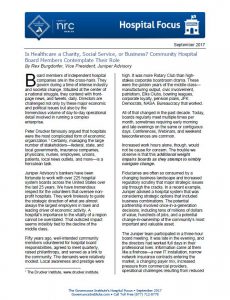Is Healthcare a Charity, Social Service, or Business?
 Board members of independent hospital companies are in the cross-hairs. They govern during a time of intense industry and societal change. Situated at the center of a national struggle, they contend with front-page news, and tweets, daily. Directors are challenged not only by these major economic and political issues but also by the tremendous volume of day-to-day operational detail involved in running a complex enterprise.
Board members of independent hospital companies are in the cross-hairs. They govern during a time of intense industry and societal change. Situated at the center of a national struggle, they contend with front-page news, and tweets, daily. Directors are challenged not only by these major economic and political issues but also by the tremendous volume of day-to-day operational detail involved in running a complex enterprise.
Peter Drucker famously argued that hospitals were the most complicated form of economic organization.¹ Certainly, managing the large number of stakeholders—federal, state, and local governments, insurance companies, physicians, nurses, employees, unions, patients, local news outlets, and more—is a herculean task.
Fifty years ago, well-intended community members volunteered for hospital board responsibilities, agreed to meet quarterly, raised philanthropy, and served as a link to the community. The demands were relatively modest. Local awareness and prestige were high. It was more Rotary Club than highstakes corporate boardroom drama. These were the golden years of the middle class— manufacturing output, civic involvement, patriotism, Elks Clubs, bowling leagues, corporate loyalty, pension plans, JFK Democrats, NASA. Bureaucracy that worked. All of that changed in the past decade. Today, boards regularly meet multiple times per month, sometimes requiring early morning and late evenings on the same or contiguous days. Conferences, Webinars, and weekend teleconferences are common. Increased work hours alone, though, would not be cause for concern. The trouble we observe is that this additional weight impairs boards as they attempt to nimbly navigate change.